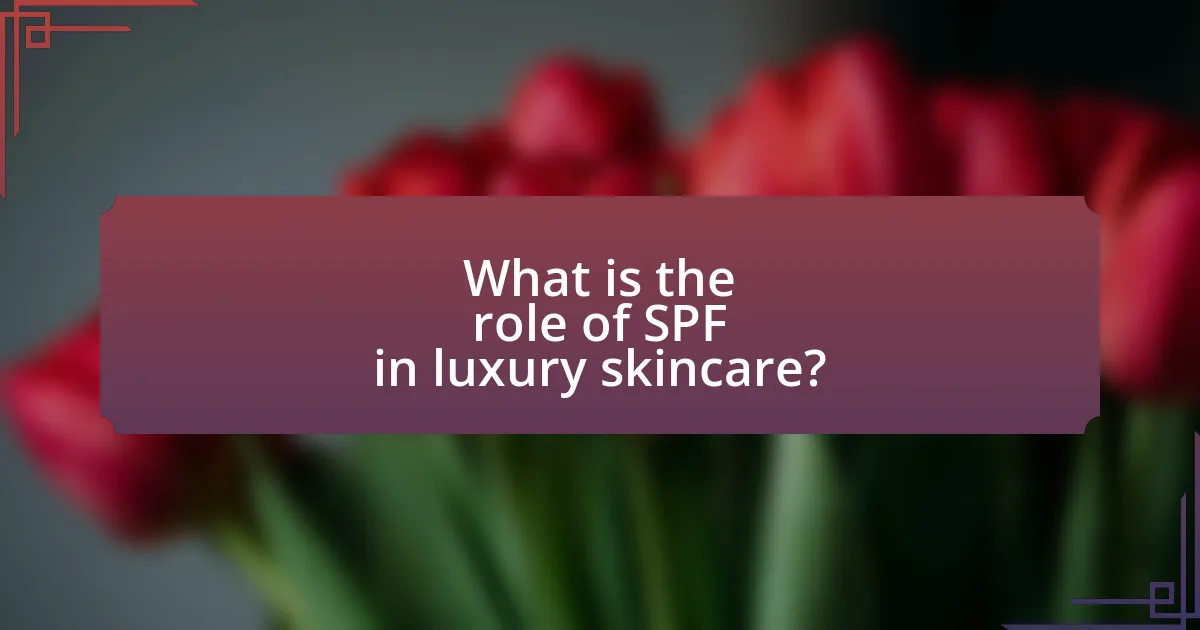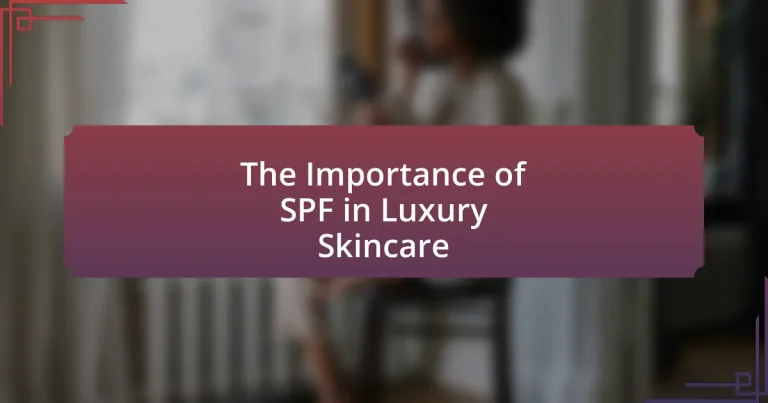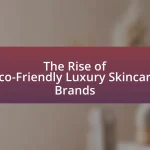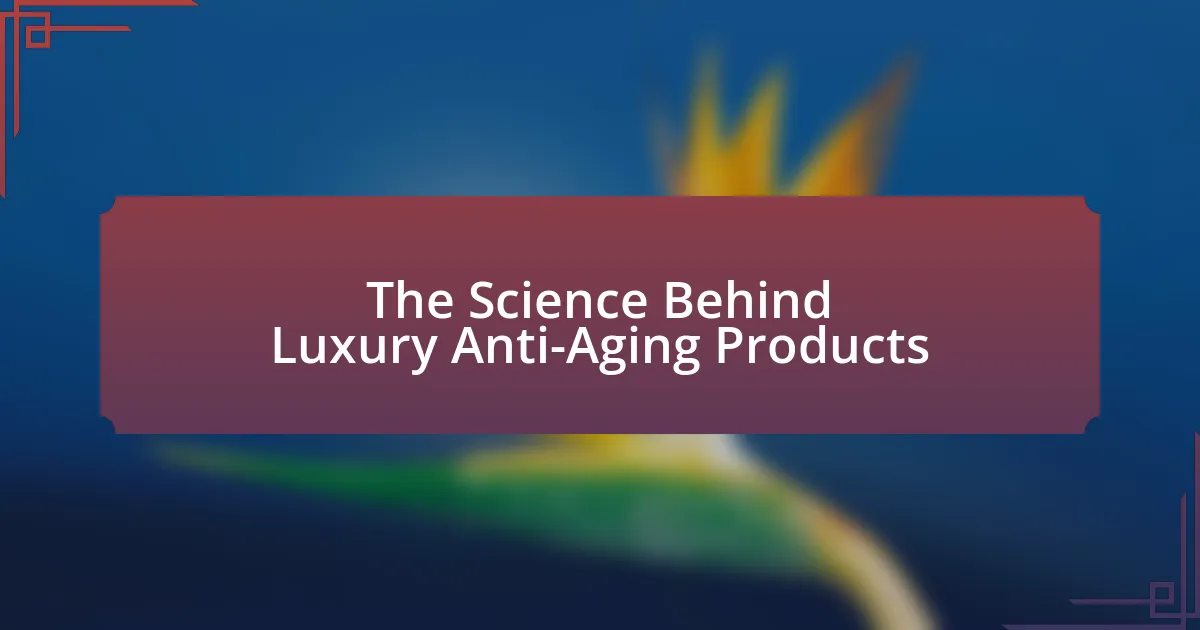The main entity of the article is the role of SPF (Sun Protection Factor) in luxury skincare. The article emphasizes the critical importance of SPF in protecting the skin from harmful UV radiation, which can lead to skin damage, premature aging, and skin cancers. It discusses the essential inclusion of high-quality SPF formulations in luxury skincare products, highlighting their advanced ingredients and innovative technologies that enhance both protection and skin health. Additionally, the article addresses common misconceptions about SPF, best practices for its application, and the latest trends in luxury skincare that prioritize multifunctional products combining sun protection with other skin benefits.

What is the role of SPF in luxury skincare?
SPF, or Sun Protection Factor, plays a crucial role in luxury skincare by protecting the skin from harmful ultraviolet (UV) radiation. This protection helps prevent skin damage, premature aging, and skin cancers, which are significant concerns in skincare. Luxury skincare brands often incorporate high-quality SPF formulations to ensure effective protection while maintaining skin health and enhancing overall appearance. Research indicates that daily use of SPF can reduce the risk of skin cancer by up to 50%, underscoring its importance in any skincare regimen, particularly in premium products that prioritize skin health and aesthetics.
Why is SPF essential in skincare routines?
SPF is essential in skincare routines because it protects the skin from harmful ultraviolet (UV) radiation, which can lead to skin cancer, premature aging, and other skin damage. Research indicates that regular use of sunscreen with a high SPF can reduce the risk of developing melanoma by 50% and significantly decrease the incidence of non-melanoma skin cancers. Additionally, SPF helps maintain skin health by preventing photoaging, which is characterized by wrinkles, loss of elasticity, and pigmentation changes. Therefore, incorporating SPF into daily skincare is crucial for long-term skin protection and overall health.
What are the harmful effects of UV rays on the skin?
UV rays cause significant harm to the skin, including sunburn, premature aging, and an increased risk of skin cancer. Sunburn occurs due to overexposure to UV radiation, leading to redness, pain, and peeling of the skin. Premature aging manifests as wrinkles, fine lines, and age spots, primarily from UVA rays that penetrate deep into the skin. Furthermore, UV exposure is a major risk factor for skin cancers, including melanoma, basal cell carcinoma, and squamous cell carcinoma, with the World Health Organization stating that UV radiation is responsible for 90% of nonmelanoma skin cancers. These harmful effects underscore the necessity of using SPF in skincare to protect against UV damage.
How does SPF protect against skin damage?
SPF protects against skin damage by absorbing or reflecting harmful ultraviolet (UV) radiation from the sun. Specifically, SPF (Sun Protection Factor) indicates the level of protection a sunscreen provides against UVB rays, which are primarily responsible for sunburn and contribute to skin cancer. For example, an SPF of 30 blocks approximately 97% of UVB rays, significantly reducing the risk of skin damage. Studies have shown that regular use of SPF can prevent photoaging, skin discoloration, and the development of skin cancers, reinforcing its critical role in skincare routines.
What distinguishes luxury skincare products with SPF?
Luxury skincare products with SPF are distinguished by their high-quality ingredients, advanced formulations, and superior sensory experiences. These products often incorporate premium active ingredients, such as antioxidants and peptides, which enhance skin health while providing sun protection. Additionally, luxury brands typically invest in extensive research and development, resulting in innovative delivery systems that improve the efficacy and absorption of SPF. For example, studies have shown that formulations with encapsulated sunscreens can offer better stability and longer-lasting protection. Furthermore, luxury skincare products often feature elegant textures and fragrances, elevating the overall user experience, which is a key differentiator in the luxury market.
How do luxury brands formulate their SPF products differently?
Luxury brands formulate their SPF products differently by incorporating higher-quality ingredients and advanced technology to enhance efficacy and sensory experience. These brands often utilize broad-spectrum protection with a combination of physical and chemical filters, ensuring comprehensive UV protection while minimizing skin irritation. For instance, luxury SPF formulations may include antioxidants, peptides, and botanical extracts that not only protect against UV damage but also provide additional skin benefits, such as hydration and anti-aging properties. This approach is supported by research indicating that premium formulations can lead to better skin health outcomes, as seen in studies highlighting the effectiveness of antioxidants in reducing UV-induced skin damage.
What ingredients are commonly found in luxury SPF skincare?
Luxury SPF skincare commonly includes ingredients such as zinc oxide, titanium dioxide, hyaluronic acid, antioxidants like vitamin C and E, and botanical extracts. Zinc oxide and titanium dioxide serve as physical blockers that protect the skin from UVA and UVB rays, while hyaluronic acid provides hydration, enhancing skin texture. Antioxidants like vitamin C and E help neutralize free radicals generated by sun exposure, contributing to skin health. Botanical extracts, such as green tea and aloe vera, offer additional soothing and anti-inflammatory benefits, making these formulations not only protective but also nourishing for the skin.
How does SPF contribute to overall skin health?
SPF contributes to overall skin health by protecting the skin from harmful ultraviolet (UV) radiation, which can lead to skin damage, premature aging, and increased risk of skin cancer. Regular use of SPF prevents sunburn and reduces the likelihood of developing conditions such as hyperpigmentation and photoaging. Studies indicate that daily application of broad-spectrum SPF can decrease the risk of melanoma by up to 50% and significantly lower the incidence of non-melanoma skin cancers. This protective effect underscores the essential role of SPF in maintaining skin integrity and promoting long-term skin health.
What long-term benefits does regular SPF use provide?
Regular SPF use provides significant long-term benefits, including reduced risk of skin cancer, prevention of premature aging, and maintenance of even skin tone. Studies indicate that consistent application of SPF can lower the incidence of melanoma by up to 50%, as reported by the American Academy of Dermatology. Additionally, SPF protects against photoaging, which manifests as wrinkles and fine lines, by blocking harmful UV rays that accelerate skin aging. Furthermore, regular use of SPF helps prevent hyperpigmentation, ensuring a more uniform complexion over time.
How does SPF usage affect skin aging and appearance?
SPF usage significantly reduces skin aging and improves appearance by protecting against harmful UV radiation. Regular application of SPF prevents photoaging, which includes wrinkles, fine lines, and hyperpigmentation caused by sun exposure. Studies indicate that daily use of broad-spectrum sunscreen can decrease the risk of skin cancer and maintain skin elasticity, leading to a more youthful appearance. For instance, research published in the Journal of Investigative Dermatology found that participants who used sunscreen daily showed 24% less skin aging compared to those who did not. Thus, incorporating SPF into skincare routines is essential for preserving skin health and aesthetics.
What are the misconceptions about SPF in luxury skincare?
Misconceptions about SPF in luxury skincare include the belief that higher SPF guarantees better protection and that luxury products inherently provide superior sun protection. Many consumers assume that an SPF of 50 is twice as effective as SPF 25, but studies show that the difference in UVB protection is minimal, with SPF 30 blocking about 97% of UVB rays compared to SPF 50’s 98%. Additionally, luxury skincare brands may not always use the most effective sun filters or formulations, leading to inadequate protection despite a higher price point. This highlights the importance of understanding SPF ratings and ingredients rather than relying solely on brand prestige.
Why do some people believe SPF is unnecessary in luxury products?
Some people believe SPF is unnecessary in luxury products because they prioritize other skincare benefits over sun protection. This perception is often influenced by the belief that luxury products should focus on anti-aging, hydration, or skin texture improvements, rather than sun defense. Additionally, some consumers may assume that high-quality ingredients in luxury products provide sufficient protection against UV damage, despite studies indicating that SPF is essential for preventing skin cancer and premature aging.
How can misinformation about SPF impact skincare choices?
Misinformation about SPF can lead individuals to make poor skincare choices, such as underestimating the need for sun protection or using inadequate SPF products. For instance, believing that a low SPF is sufficient for all-day protection can result in increased skin damage and a higher risk of skin cancer. Studies show that only 30% of people apply sunscreen correctly, often due to misconceptions about its effectiveness and application frequency. This highlights the critical need for accurate information to ensure proper skincare practices that protect against UV damage.
What are the best practices for using SPF in luxury skincare?
The best practices for using SPF in luxury skincare include applying a broad-spectrum sunscreen with an SPF of at least 30, using it daily regardless of weather conditions, and reapplying every two hours or immediately after swimming or sweating. Broad-spectrum sunscreens protect against both UVA and UVB rays, which are crucial for preventing skin damage and aging. Daily application is essential because UV rays can penetrate clouds and windows, leading to cumulative skin damage over time. Reapplication is necessary to maintain effective protection, as sunscreen can wear off due to factors like sweating or towel drying. According to the American Academy of Dermatology, consistent use of sunscreen can significantly reduce the risk of skin cancer and premature aging.
How should SPF be applied for maximum effectiveness?
SPF should be applied generously and evenly to all exposed skin to achieve maximum effectiveness. For optimal results, apply a broad-spectrum sunscreen with an SPF of at least 30 about 15 to 30 minutes before sun exposure, ensuring to cover areas often missed, such as the ears, neck, and the tops of feet. Reapplication is crucial; sunscreen should be reapplied every two hours, or immediately after swimming or sweating, as studies indicate that proper application and reapplication significantly enhance protection against UV radiation, reducing the risk of skin damage and premature aging.
What are common mistakes to avoid when using SPF products?
Common mistakes to avoid when using SPF products include applying insufficient amounts, not reapplying regularly, and using expired products. Insufficient application can lead to inadequate protection; studies show that most people apply only 25-50% of the recommended amount, significantly reducing effectiveness. Not reapplying SPF every two hours, especially after sweating or swimming, compromises sun protection, as SPF effectiveness diminishes over time. Additionally, using expired SPF products can result in decreased efficacy, as the active ingredients may break down and fail to provide adequate protection against UV rays.
How can consumers choose the right luxury SPF product?
Consumers can choose the right luxury SPF product by assessing the SPF level, ingredients, skin type compatibility, and brand reputation. A higher SPF, such as 30 or above, provides better protection against UV rays, which is crucial for preventing skin damage. Ingredients like zinc oxide or titanium dioxide offer physical sun protection, while antioxidants can enhance skin health. Additionally, consumers should consider their skin type; for instance, those with oily skin may prefer lightweight, oil-free formulations. Finally, selecting products from reputable luxury brands known for their quality and efficacy can ensure a reliable choice.
What factors should be considered when selecting an SPF product?
When selecting an SPF product, factors such as the SPF rating, broad-spectrum protection, skin type compatibility, water resistance, and ingredient safety should be considered. The SPF rating indicates the level of protection against UVB rays, with higher numbers providing greater protection. Broad-spectrum protection ensures defense against both UVA and UVB rays, which is crucial for preventing skin damage and aging. Skin type compatibility is important; for instance, oily skin may benefit from a lightweight, non-comedogenic formula, while dry skin may require a moisturizing SPF. Water resistance is essential for those engaging in activities like swimming or sweating, as it determines how long the product remains effective when exposed to water. Lastly, ingredient safety is vital; opting for products free from harmful chemicals, such as oxybenzone, can reduce the risk of skin irritation and environmental harm.
How can one determine the right SPF level for their skin type?
To determine the right SPF level for an individual’s skin type, one should consider their skin’s sensitivity to sun exposure, which is influenced by factors such as skin tone, history of sunburns, and existing skin conditions. For example, individuals with fair skin or a history of sunburns typically require a higher SPF, such as SPF 30 or above, to provide adequate protection. In contrast, those with darker skin tones may find that a lower SPF, around SPF 15 to 30, is sufficient, as their skin contains more melanin, which offers some natural protection against UV rays. Additionally, dermatological guidelines recommend using broad-spectrum sunscreens that protect against both UVA and UVB rays, as this ensures comprehensive skin protection.
What are the latest trends in luxury skincare with SPF?
The latest trends in luxury skincare with SPF focus on multifunctional products that combine sun protection with anti-aging and hydrating benefits. Brands are increasingly incorporating advanced ingredients like antioxidants, peptides, and botanical extracts to enhance skin health while providing broad-spectrum UV protection. For instance, luxury brands are now offering lightweight formulations that blend seamlessly into the skin, ensuring a natural finish without the white cast often associated with traditional sunscreens. Additionally, there is a growing emphasis on sustainable packaging and clean formulations, reflecting consumer demand for environmentally friendly products. These trends are supported by market research indicating that consumers are prioritizing skincare products that offer both efficacy and luxury experiences.
How are luxury brands innovating in SPF formulations?
Luxury brands are innovating in SPF formulations by incorporating advanced technologies and unique ingredients that enhance both protection and skin benefits. For instance, brands like La Prairie and Estée Lauder are utilizing encapsulation techniques to deliver active ingredients more effectively, ensuring longer-lasting protection against UV rays. Additionally, luxury brands are increasingly focusing on broad-spectrum protection, combining chemical and physical filters to provide comprehensive defense against UVA and UVB rays. Research indicates that formulations with antioxidants, such as vitamin C and E, are being integrated to combat oxidative stress caused by sun exposure, further enhancing skin health. This trend reflects a growing consumer demand for multifunctional products that not only protect but also nourish the skin.
What new technologies are being integrated into SPF products?
New technologies being integrated into SPF products include advanced UV filters, encapsulation techniques, and digital skin analysis tools. Advanced UV filters, such as Tinosorb M and Tinosorb S, provide broad-spectrum protection while being photostable and less irritating to the skin. Encapsulation techniques enhance the stability and efficacy of active ingredients, allowing for sustained release and improved skin absorption. Digital skin analysis tools, often powered by artificial intelligence, enable personalized SPF recommendations based on individual skin types and environmental factors, ensuring optimal protection. These innovations reflect the ongoing evolution of SPF formulations in luxury skincare, aiming to enhance both effectiveness and user experience.
What tips can enhance the effectiveness of SPF in luxury skincare?
To enhance the effectiveness of SPF in luxury skincare, apply sunscreen generously and evenly to all exposed skin, ensuring a minimum of one ounce for full body coverage. This practice is supported by dermatological guidelines, which recommend reapplying every two hours, or more frequently if swimming or sweating, to maintain optimal protection. Additionally, using a broad-spectrum SPF of at least 30 is crucial, as it protects against both UVA and UVB rays, reducing the risk of skin damage and premature aging. Incorporating antioxidants in your skincare routine can further bolster SPF effectiveness by neutralizing free radicals generated by UV exposure.





